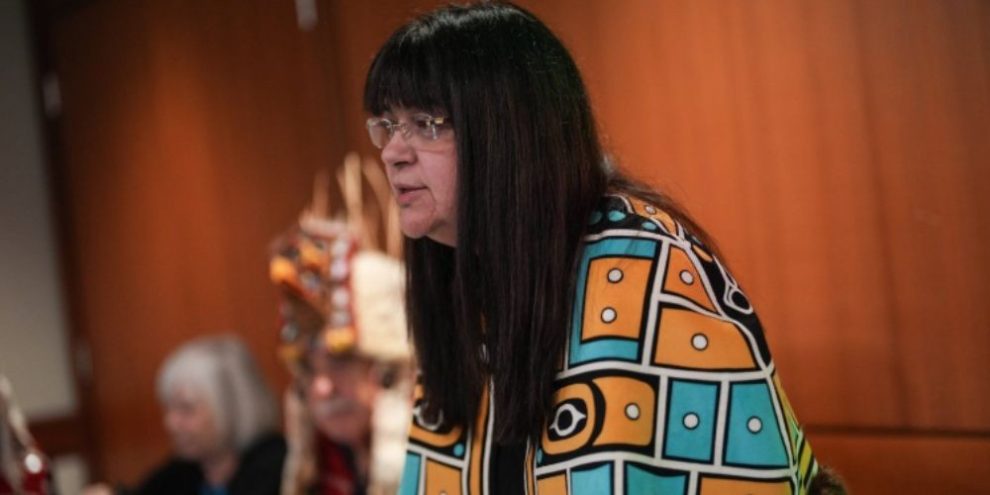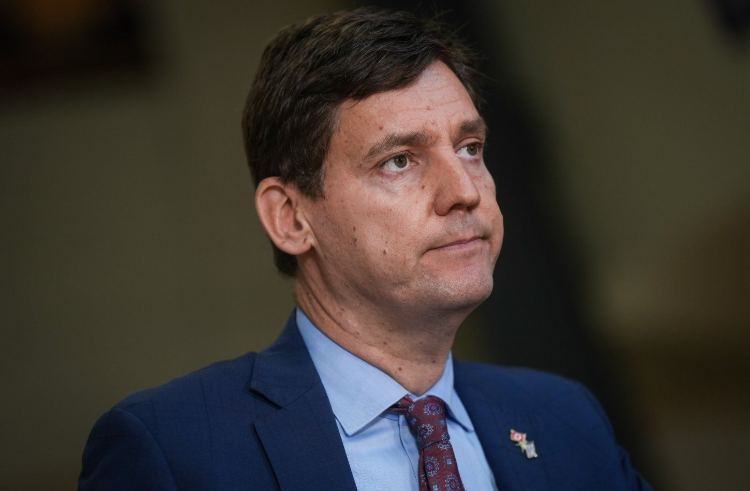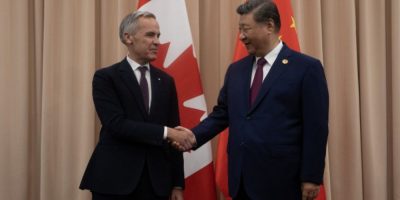
Updated November 27, 2025 @ 5:47pm
British Columbia Premier David Eby and First Nations have thrown up a wall of opposition to a proposed northern oil pipeline, after Alberta and the federal government signed a memorandum of understanding to work toward making it a reality.
Eby said Thursday that the pipeline proposal was a distraction that had already cost B.C. another investment opportunity, dubbing it a potential “energy vampire” draining federal, Indigenous and provincial resources.
Eby — who has called the project "fictional" — drew the line at legal action and said the province would not be going to court, as it did unsuccessfully against the Trans Mountain Pipeline expansion.
Coastal First Nations president Marilyn Slett had no such qualms, telling a news conference they would use "every tool in our tool box to ensure that this pipeline does not go ahead."
"We're looking at the legal options. We're looking at our communities. Our communities are mobilizing," she told a news conference.
She said in a statement that the project was never going to happen, that a tanker ban on the north coast "is not up for negotiation," and the First Nations "will never tolerate any exemptions or carveouts, period."
Barrie's News Delivered To Your Inbox
By submitting this form, you are consenting to receive marketing emails from: Central Ontario Broadcasting, 431 Huronia Rd, Barrie, Ontario, CA, https://www.cobroadcasting.com. You can revoke your consent to receive emails at any time by using the SafeUnsubscribe® link, found at the bottom of every email. Emails are serviced by Constant Contact
The memorandum of understanding commits Canada and Alberta to working toward a northern pipeline to B.C.'s coast, with Alberta acting as the proponent, and the federal government making changes to a tanker ban on the north coast "if necessary."
Its signing comes after weeks of sniping between Eby and his counterparts in the Prairies.
Eby, who spoke in Victoria with the majority of his NDP caucus cheering him on from the steps of the B.C. legislature, said Saskatchewan Premier Scott Moe was talking to Smith about the pipeline this month when he should have been talking with him about problems that potash company Nutrien was having getting its product to market.

Eby said that resulted in Nutrien deciding to ship Saskatchewan potash to global markets through Washington state, bypassing B.C.
"It really pissed me off that we lost the Nutrien deal, because I think that was entirely avoidable, and that is the one that gets under my skin," said Eby, adding that B.C. and Canada could not afford to "lose real projects in the name of politics right now."
The characterization of the pipeline as a non-existent political exercise had earlier been made by Eby's Energy Minister Adrian Dix in the legislature, saying Canada needed to focus on "real projects" in contrast to "performative politics."
Dix said a "Team Canada" approach should embrace projects that create jobs and unlock financial opportunities, as opposed to "MOUs on projects that don't exist."
The MOU says Ottawa and Alberta will engage with Indigenous Peoples in both Alberta and B.C. and promises to offer the opportunity for Indigenous co-ownership and "other forms of economic benefits."
But Slett said Coastal First Nations have "zero interest" in co-owning or benefiting from a project that has the potential to destroy their way of life, citing the risk of a catastrophic oil spill.
"The honour of the Crown, means the federal government must consult with us on a nation to nation basis and Canada's domestic and international legal commitments mean they must seek our consent," she told her news conference.
"We will never consent to allowing oil tankers in our coastal waters. We will never tolerate exemptions to an oil tanker ban that has existed for over 50 years, and it is foundational to protecting our economy and our way of life."
None of that sort of opposition, which reflects long-held positions, has dampened Smith's enthusiasm for the project, and the MOU says Alberta and Canada "recognize their obligations to consult with, and where appropriate accommodate, Indigenous Peoples."
The MOU also promises to collaborate with B.C. to ensure its residents "share substantial economic and financial benefits of the proposed pipeline."
Smith said earlier Thursday that while there would have to be discussions about the pipeline with B.C., there's "no mention of veto" for that province in the MOU.
"I think British Columbia has tried to use every tool in the tool box," she said after the signing ceremony, referring to failed efforts by B.C. to block the Trans Mountain Pipeline expansion.
"I guess that was the term that they used before, and failed. It was clearly affirmed by the courts that this is not British Columbia's decision to make."
Smith said "a number of projects" that initially faced opposition in B.C. went on to get "a lot of enthusiasm," citing LNG and other projects.
B.C. Conservative Opposition Leader John Rustad said the pipeline is the "right thing to do" for Canada, including B.C.
Simon Fraser University political science professor Andy Hira said he remains skeptical a new pipeline would ever go forward despite the MOU, calling it “political theatre” and an attempt by the federal Liberal government to win support in Alberta, a Conservative stronghold.
“There are provisions in the federal proposal that suggest that there have to be some acceptance by First Nations and jurisdictions that will be affected by the pipeline,” Hira said. “And to me, that is going to be a poison pill for the whole deal.”
Jason Alsop, president of the Council of Haida Nation and vice-president of the Great Bear Initiative, an alliance of Coastal First Nations, said he was disappointed in the MOU, also calling it political theatrics that won't advance a pipeline.
"We've been very clear that the Coastal First Nations, the Haida Nation, the people of the coast, will never allow oil tankers or this pipeline in our territory because of the risks to our culture, our way of life and our self-sufficiency," he said.
"The ocean is what looks after us, and we have a responsibility to uphold that."
This report by The Canadian Press was first published Nov. 27, 2025.





